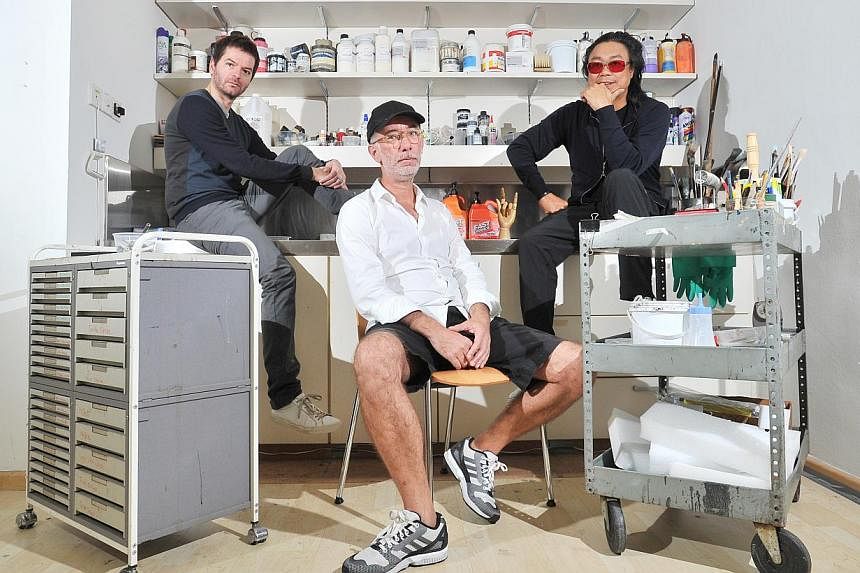Exquisite Corpse is a rather alarming name for what is essentially a children's game.
It starts with someone writing down the opening word of a sentence on a piece of paper. After folding the paper over to hide the word, it is then passed on to someone else, who adds his or her contribution to the mix.
A whole series of adjectives, verbs and nouns is assembled in this jumbled, piecemeal manner until the last person in the chain unfolds the paper, revealing the collectively constructed sentence.
A trio of acclaimed international artists took up residency at the Singapore Tyler Print Institute last week to begin a long-term, print-oriented version of that game.
The group comprises Belgian Carsten Holler, Thai Rirkrit Tiravanija and Albanian Anri Sala. While Holler and Tiravanija are known for their installation works, Sala works primarily in video. A final artist who will be playing the game, German Tobias Rehberger, will be at the institute at the end of this month.
Over the course of this year, they will each create a print work which will be passed around for the others to work on. The rules are simple: There are no themes, but the artist who starts a work decides on its medium and size. The artists also have to keep their work a secret from one another.
Speaking to Life!, it is clear that the trio are great friends. They have known one another for more than 15 years and interact with an easy familiarity.
When asked whose idea the Exquisite Corpse game was, Tiravanija and Sala point to Holler, who protests: "It just came up, it's a kind of logical development. I don't think it's anyone's idea."
His works include Test Site (2006), which famously invited visitors to London's Tate Modern to hurtle down a massive installation of slides in the art museum's Turbine Hall.
He explains that the Exquisite Corpse game was devised by the Surrealists. Well-known artists who played the game include Andre Breton, Yves Tanguy and Marcel Duchamp, and the morbid name was derived from one of the first sentences created by the Surrealists using this method: "The exquisite corpse shall drink the new wine."
Holler, 53, adds that the whole idea of doing it in print "is really an experiment". "Print is also a lot of handicraft, and not a lot of technology, so at the end, you're always surprised to see what comes out. And what we wanted to do is enhance this surprise by having the concept of the Exquisite Corpse."
As each is not allowed to tell the others what he is working on, their descriptions of their creations are all in the vaguest of terms.
Sala, 40, who won last year's Vincent award, a prestigious prize for contemporary art in Europe, says: "Without trying to say anything, sometimes an idea does not come as an idea which produces an image, but it's just a way to deal with a medium, a certain technique."
Tiravanija, 53, whose works are in major museums such as New York's Guggenheim and the Museum of Modern Art, adds mysteriously that his work is "big, as big as possible, or maybe very small". He is the only one in the quartet who has worked with the print institute before, having completed a five-week residency there last year.
Holler, the most direct of the trio, says his work is based on the idea of Mengenlehre, or a German mathematical method for children. "It's very simple. Different entities which are represented by circles can overlap or are within one another. You can explain mathematics graphically, so it's quite convenient, but the method is a bit forgotten now."
They do not know when they will make the exchanges, but all four pieces will be ready next year.
Working within the Exquisite Corpse framework means that the art-making process will involve losing control as they pass their work to another artist. None of them has worked in this way before.
"It is interesting for two reasons. One will be that there is no control over what the thing will look like or what it will become," says Sala. "And as we do not necessarily have a background in print, for me, that's another way of letting go."
Meanwhile, Tiravanija says the psychological aspect of the game also comes into play.
"I kind of know what Anri does and I have to think about and anticipate what Carsten would do. It's an interesting game in your head, to anticipate things, but that's also what is fun and interesting about this project."


